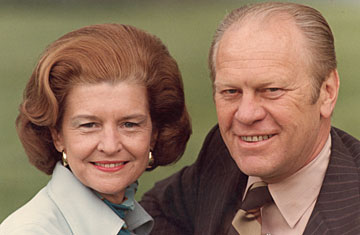
Betty Ford and her husband, President Gerald Ford, are shown in a 1976 photo. The former First Lady, who brought her struggles with alcoholism and breast cancer into the public spotlight, died July 8, 2011, at 93
(3 of 4)
Her adamant normality had a revolutionary tint when it came to dealing with the press. She was both a victim and vanquisher of the media monster that roared onto the scene after the revelations of Watergate, when a newly empowered press corps felt leave to ask anyone anything. A stoic Yankee of more private disposition might have struggled with the expectations; Betty Ford's Midwestern reflex was to answer whatever she was asked. "You're very foolish if you try to beat around the bush," she observed. "You just meet yourself going around the bush the other way." Some Ford advisers wanted to keep her under wraps, warning that she was costing her husband conservative votes. But others understood the deeper message she was sending. The previous Administration, including a President re-elected in a huge landslide, had turned out to be full of liars and rogues. The institutional machineries of law enforcement and tax collection and intelligence gathering had all been rewired for political ends. It was hard to know whom to trust anymore — and the kind of fearless, unembarrassed honesty she projected was the only antidote to sustained suspicion.
So when Morley Safer pressed her on 60 Minutes about whether her kids had smoked pot, she said she assumed they had experimented with it. Asked how she'd react if her 18-year-old daughter Susan were found having an affair, she said she wouldn't be surprised and would "want to know pretty much about the young man." A Harris poll following the interview found that the public largely approved of that view: 64%, vs. 23% disapproving. "I was completely dumbfounded," Ford said. When she told a Washington columnist that nearly the only question she had not been asked was how often she slept with her husband, the columnist replied, "Well, how often do you?" "As often as possible!" she replied. And she made no secret of her political priorities, particularly in the areas of women's rights and the mentally ill.
But it would be matters even more personal that truly put her transparency to the test. Ford learned about her breast cancer seven weeks after her husband became President. There was not much time to debate what to say — nor much need. "There had been so much cover-up during Watergate that we wanted to be sure there would be no cover-up in the Ford administration," she told Gloria Steinem in a 1984 interview. "So rather than continue this traditional silence about breast cancer, we felt we had to be very public."
No public figure had discussed her treatment, including a radical mastectomy, so bluntly or in such detail. "I felt very self-conscious," she said later, recalling the aftermath of the surgery. "The first time I walked down those stairs for a formal reception and everyone was waiting for us to arrive, I knew they were saying, 'Which breast did she say it was?' " But her discomfort was a price she willingly paid; millions of women began performing self-exams, going for screenings — and telling Ford that she had saved their lives by helping them detect cancer early (this latter group included the Vice President's wife Happy Rockefeller). In fact, the explosion of screening meant that the reported incidence of the disease rose; some researchers called this the Betty Ford blip.
The second test was an even greater challenge, since it involved a battle she had waged all through her public life. Betty Ford's mother Hortense used to say that her youngest child "popped out of a bottle of champagne." Betty said she always liked that idea — though the day came when she almost drowned in one. By the mid-1960s, Betty was struggling with her roles as political wife, single mother and civic leader. In 1964, when she was 46, she pinched a nerve, likely while trying to open a window. She was put in traction and did physical therapy, but the pain, combined with arthritis, left her dependent on prescription drugs and evening cocktails. Within a year, she had fantasies about running away from home just to make her family worry. That's when she began seeing a psychiatrist.
